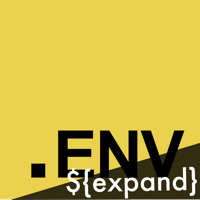
Security News
CVE Volume Surges Past 48,000 in 2025 as WordPress Plugin Ecosystem Drives Growth
CVE disclosures hit a record 48,185 in 2025, driven largely by vulnerabilities in third-party WordPress plugins.
dotenv-expand
Advanced tools
Special thanks to our sponsors



Dotenv-expand adds variable expansion on top of dotenv. If you find yourself needing to expand environment variables already existing on your machine, then dotenv-expand is your tool.
# Install locally (recommended)
npm install dotenv-expand --save
Or installing with yarn? yarn add dotenv-expand
Create a .env file in the root of your project:
PASSWORD="s1mpl3"
DB_PASS=$PASSWORD
As early as possible in your application, import and configure dotenv and then expand dotenv:
const dotenv = require('dotenv')
const dotenvExpand = require('dotenv-expand')
dotenvExpand.expand(dotenv.config())
console.log(process.env) // remove this after you've confirmed it is expanding
That's it. process.env now has the expanded keys and values you defined in your .env file.
dotenvExpand.expand(dotenv.config())
...
connectdb(process.env.DB_PASS)
Note: Consider using
dotenvxinstead of preloading. I am now doing (and recommending) so.It serves the same purpose (you do not need to require and load dotenv), has built-in expansion support, adds better debugging, and works with ANY language, framework, or platform. – motdotla
You can use the --require (-r) command line option to preload dotenv & dotenv-expand. By doing this, you do not need to require and load dotenv or dotenv-expand in your application code. This is the preferred approach when using import instead of require.
$ node -r dotenv-expand/config your_script.js
The configuration options below are supported as command line arguments in the format dotenv_config_<option>=value
$ node -r dotenv-expand/config your_script.js dotenv_config_path=/custom/path/to/your/env/vars
Additionally, you can use environment variables to set configuration options. Command line arguments will precede these.
$ DOTENV_CONFIG_<OPTION>=value node -r dotenv-expand/config your_script.js
$ DOTENV_CONFIG_ENCODING=latin1 node -r dotenv-expand/config your_script.js dotenv_config_path=/custom/path/to/.env
See tests/.env.test for simple and complex examples of variable expansion in your .env
file.
dotenv-expand exposes one function:
expand will expand your environment variables.
const env = {
parsed: {
BASIC: 'basic',
BASIC_EXPAND: '${BASIC}',
BASIC_EXPAND_SIMPLE: '$BASIC'
}
}
console.log(dotenvExpand.expand(env))
Default: process.env
Specify an object to write your secrets to. Defaults to process.env environment variables.
const myEnv = {}
const env = {
processEnv: myEnv,
parsed: {
HELLO: 'World'
}
}
dotenvExpand.expand(env)
console.log(myEnv.HELLO) // World
console.log(process.env.HELLO) // undefined
See a full list of rules here.
process.env, for example pas$word)?As of v12.0.0 dotenv-expand no longer expands process.env.
If you need this ability, use dotenvx by shipping an encrypted .env file with your code - allowing safe expansion at runtime.
Use dotenvx as dotenv-expand does not support this.
dotenv-expand is a separate module (without knowledge of the loading of process.env and the .env file) and so cannot reliably know what to override.
See CONTRIBUTING.md
See CHANGELOG.md
env-cmd is a simple node program for executing commands using an environment from an env file. It is similar to dotenv-expand in that it helps manage environment variables, but it does not support variable expansion.
cross-env allows you to run scripts that set and use environment variables across platforms. It is similar to dotenv-expand in the sense that it helps with environment variables, but it does not support .env file variable expansion.
envfile is a package to parse and stringify the envfile format. It is similar to dotenv-expand in that it works with .env files, but it does not support variable expansion within the .env file itself.
FAQs
Expand environment variables using dotenv
The npm package dotenv-expand receives a total of 20,316,407 weekly downloads. As such, dotenv-expand popularity was classified as popular.
We found that dotenv-expand demonstrated a healthy version release cadence and project activity because the last version was released less than a year ago. It has 1 open source maintainer collaborating on the project.
Did you know?

Socket for GitHub automatically highlights issues in each pull request and monitors the health of all your open source dependencies. Discover the contents of your packages and block harmful activity before you install or update your dependencies.

Security News
CVE disclosures hit a record 48,185 in 2025, driven largely by vulnerabilities in third-party WordPress plugins.

Security News
Socket CEO Feross Aboukhadijeh joins Insecure Agents to discuss CVE remediation and why supply chain attacks require a different security approach.

Security News
Tailwind Labs laid off 75% of its engineering team after revenue dropped 80%, as LLMs redirect traffic away from documentation where developers discover paid products.